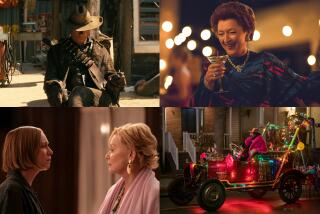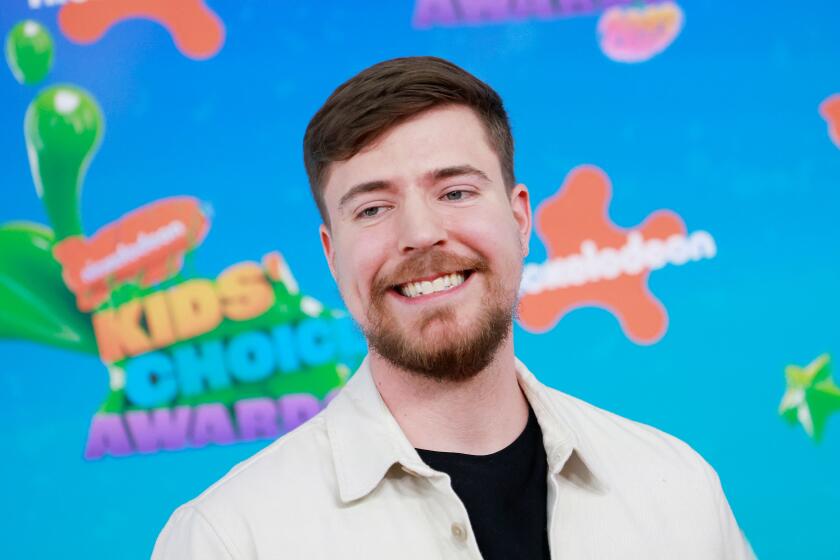‘New Girl’ writers discuss Sundance Channel’s ‘The Writers’ Room’
They gave us a slow-motion chicken dance, Max Greenfield in a fat suit (numerous times) and the epic friend/roommate kiss.
The “New Girl” writers room has kept busy concocting a steady stream of adorkable and nutty storylines for the Fox comedy in its short run. Now Sundance Channel is giving viewers a peak at how the funny is made, spotlighting the crew in its latest episode of “The Writers’ Room.”
The Sundance Channel series has lifted the curtain behind some of television’s VIPs—including “Breaking Bad,” “Parks and Recreation,” and even those hard-to-ignore Geico commercials—by turning the lens on the writers. It’s hosted by Jim Rash, an Academy Award-winning screenwriter who moonlights as Dean Pelton on NBC’s “Community”
In Monday night’s episode, “New Girl” executive producers and writers Liz Meriwhether, Dave Finkel and Brett Baer, as well as star Jake Johnson (Nick), hit the conference table, speaking on behalf of the show’s 17-member writing staff.
PHOTOS: Hollywood backlot moments
We spoke to Meriwether and Finkel, who took a break from, uh, their own writers room as they work full-speed on the upcoming third season of “New Girl,” to talk about their episode. Read on to get their thoughts on the “Alice in Wonderland” experience--and watch the exclusive sneak peak above.
How was being on this show presented to you—did you know what to expect?
Finkel: Not really. My memory of it was we heard there was going to be this thing on the Sundance Channel and, well, we like Jim Rash so much—so it was a no-brainer to do a show he was hosting. I think more than anything it was so odd that there was an actual show that cared about what writers think and what our process is. I don’t know, it just seemed weird enough for us to be able to be involved. It was a really interesting entrée.
Is it uncomfortable to sort of let people into your world--the writers room is usually so guarded? Or does it help that you’re talking about things after the fact?
Finkel: No, it’s horrible. We are filthy, and we are unshowered—we are the worst bunch of people in the entire world. Liz, maybe you have a different take on it, but for me it was terrifying. The line between what I can actually talk about in public and what we talk about in the room is so blurred that I was just afraid I was going to go off on a tangent that was just not suitable for public consumption. It was strange; and I was worried that it would all be boring to people.
Is it surreal how things have changed, in terms of how fans have fostered interest—and, in some cases, dialogue—with behind-the-scenes folks? They know the names of show runners, executive producers, writers just as they would the actors. Does it add an element of pressure?
Meriwether: Yeah, I mean, I think there’s an emphasis these days on the show runner as somebody who is more of an artist than in the past. Then, it was more like a foreman at a factory—the perception, that is, not the actual job, because I think the job has remained the same. I think with cable and the HBO/Showtime sort of stuff, people think of TV shows as a little bit higher brow than I think they used to. It was really surreal doing “The Writers’ Room” just because I can’t believe there’d be enough people interested in what we do. We all sit in the writers room making television, and now, for some reason, we’re entering onto a television set to talk about –it was a weird “Alice in Wonderland” moment.
Didn’t you just love the set—the mock writers room. It’s unlike any writers room I’ve ever seen.
Meriwether: Yeah, I think for me that was the funniest thing—that this set that is supposed to be like a writers room, but no writers room has ever looked that nice.
Finkel: Yeah, there was no urine in the corner. There were no carcasses. Writers are disgusting.
Meriwether: Especially at the end of last year. Our room was like a pit. There was all these footprints on the walls because people put their feet up on the wall. It’s a bunch of caged animals, the writer’s room.
Finkel: It looks like the writer’s room the day before the writers start working.
Meriwether: There should be toys everywhere. Stuck to the ceiling. There is literally toys stuck to the ceiling in our writers room. Swear.
PHOTOS: Celebrities by The Times
Is there a show past or present whose writers room you would have liked to see on a show like this?
Meriwether: “Cheers,” “Seinfeld” …
Finkel: “All in the Family.” The list is endless. “Mary Tyler Moore.” We had the benefit of Norman Lear coming in last year and he talked about his process—that was so useful to us, just from a historical standpoint, just to see how it was done well. We know very well how to do it poorly. Here’s someone who has sort of nailed it time after time, so to be able to vet our own process was useful.
Who do you think gets more out of a show like “The Writers’ Room”—fans or aspiring TV writers?
Meriwhether: Hmm, I don’t know.
Finkel: Probably both. I think there’s a curiosity. When I was growing up my parents weren’t like, “I can’t wait to see what Allan Burns has come up with this week.” Things have evolved. Now I think because of mass media and social media, Liz has become a personality as much as anyone else now. People do want to hear what she has to say. She is engaging and she’s winsome.
Meriwether: Please print that.
Finkel: But, yeah, people are just as interested in Liz as Zooey [Deschanel, who stars as Jess]. I think it will be interesting to see who watches this because I think there is an audience that wants to know what makes this thing tick. Like, with PaleyFest, it’s not TV writers that show up to them, fans want to get involved with the show. They want to take ownership of it. This is another way to do it.
The much-talked-about Nick and Jess kiss is a topic of conversation in the episode. The kiss generated a lot of debate. Was it nice to sort of defend that decision?
Finkel: Yeah, I guess so. I think going into the airing of the episode, we were afraid we were going to flack. I think the actual outcome, at least what we heard, was right down the middle. We dragged our heels long enough in terms of getting it going. It was not so much about defending ourselves, I think we wanted to speak to the process of why we did it, more than feeling like we did something wrong and now we’re defending it.
Meriwether: I feel like we, I had no regrets about moving that forward. It was an interesting topic to discuss on “The Writers’ Room” because that is the kind of thing we have endless debates about in our own writer’s room. And those are some of the coolest moments in the writer’s room--when you’re making those sorts of decisions, and everyone has an impassioned opinion, and it’s a fun thing to be able to have a passionate, informed discussion with really smart people with a huge plot point for the show.
There’s a fun moment where Jim has you guys do an ad libbing task, creating a foundation of a scene on the spot. Talk about that moment—Liz, it noticeably freaked you out. Winston with a facial hair is a component. It actually all turned out very … “New Girl,” in an odd way.
Meriwether: I don’t know what ended up in the final edit, but I definitely freaked out about it. It was sort of like a worst nightmare, being put on the spot like that. That’s why I’m not a performer. There was definitely a moment where I was like, ‘Oh god, I can’t believe I am in front of a camera. This sucks.’
Finkel: I enjoyed it. It was weird.
Meriwether: Yeah, the actual exercise was really interesting. Once I got past my initial anxiety about writing an idea down in front of everyone and cameras, the actual exercise was really fun and I was actually considering doing it in our writers room this year in the middle of the season when we’re all kind of burnt out. I think it would be a really fun way to spend a couple of hours—and to see, ‘can we make a “New Girl” story sort of out of thin air. Doing that felt very much like doing improv and I think there’s so much that can be learned from improv, in terms of the creative process. What you see in the episode isn’t far off from how it really is because you have to open your mind and sort of go with it.
Finkel: The good thing about that exercise and what was interesting—we tend to be, generally as writers, a thinking group of people. Taking that off the table--over intellectualizing things--and going with your first thought and make it work, it’s not a bad idea. I wouldn’t want to do it for every episode, but it was a smart idea.
Write Jim Rash into a scene on “New Girl”—who could he play?
Meriwether: We would be so lucky. I think he is one of the funniest people on the planet.
Finkel: I could see him as Schmidt’s older brother, and I can see him as the guy that runs the bodega down the street from the loft. He could fit into any one in the “New Girl” universe.
Meriwether: I feel like he could wear a wig and Schmidt would think he’s a woman. And Schmidt would bring him home, and then discover he’s a man--which is absurd, because all that’s really woman-like is Jim’s long hair. In the end, they’d have a weird night where they talk about God. Let’s start writing this.
More to Read
The complete guide to home viewing
Get Screen Gab for everything about the TV shows and streaming movies everyone’s talking about.
You may occasionally receive promotional content from the Los Angeles Times.







